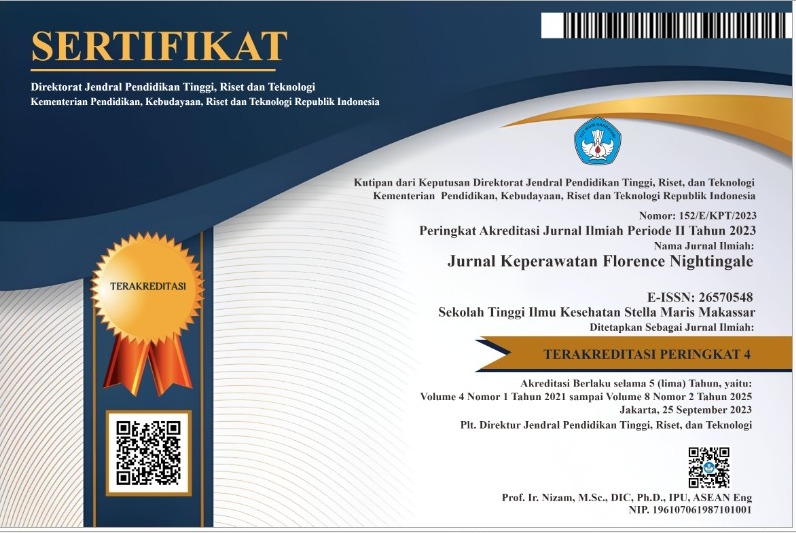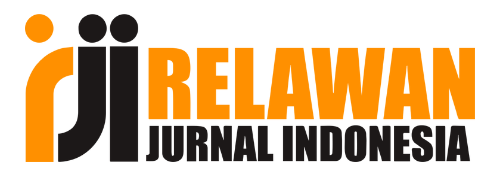Role of Self Concept Towards Attitudes of Emergency Nursing Competencies to Nursing Students in Indonesia
Keywords:
students, nursing, role of self conceptAbstract
During education, nursing students need a positive self-concept as a psychological condition as an internal motivation to encourage the formation performance professionals in emergency nursing competencies. The development of self-concept in role component includes individual perceptions ability, and self-confidence has an impact commencement of self-awareness to a professional role in nursing care in emergency work environment adequately. This study aimed analyze correlation between the role of self-concept and emergency nursing competencies to nursing students in Indonesia. Research method used a quantitative approach cross-sectional design with samples of 576 people. Data collection was a questionnaire covering the role of the professional concept self nursing and emergency nursing competencies assessment based on Association of Nursing Vocational Education Institutions Indonesian and Association of Indonesian Nursing Education Institutions. This study results showed a significant correlation with p value 0.000 (r = 0.534**). This study will provide implications development nursing curricula in Indonesia and emphasize more aspect developing mental readiness of self-concept as an integral part of nursing education, counselling, intensive training, and providing constructive feedback with professional guidance can contribute to increasing student readiness in facing challenges emergency nursing clinical practice.
Downloads
References
Alavi, N. M. (2014). Self-efficacy in nursing students. Nurs Midwifery Stud, 3(4), 1. https://doi.org/e25881
Erwin Yektiningsih, Fajar Rinawati, C. N. (2023). Hubungan komunikasi, kedudukan terhadap profesional concept self nursing pada mahasiswa keperawatan post pandemi Covid-19 di Indonesia. Jurnal Keperawatan Jiwa (JKJ), 11(4), 995–1002. https://doi.org/https://doi.org/10.26714/jkj.11.4.2023.995-1002
Feri, J., Oktaviani, E., & Soewito, B. (2021). Penyuluhan pengenalan tanda bahaya kegawatdaruratan pada bayi muda dan penanganannya di rumah. Jurnal Pengabdian Masyarakat, 4(2), 620–626. https://doi.org/10.31604/jpm.v4i2.620-626
Ghadirian, F., Salsali, M., & Cheraghi, M. A. (2014). Nursing professionalism: An evolutionary concept analysis. Iranian Journal of Nursing and Midwifery Research, 19(1), 1–10.
Haryanti, F., Nursanti, I., Nuraini, T., & Hidayati, W. (2021). Kurikulum pendidikan Ners Indonesia tahun 2021. In Asosiasi Institusi Pendidikan Ners Indonesia (AIPNI). Asosiasi Institusi Pendidikan Ners Indonesia (AIPNI).
Jahromi, Z. B., Kargar, M., & Ramezanli, S. (2015). Study of the relationship between nurse self-concept and clinical performance among nursing students. Jentashapir J Health Res., 6(5), 10–14. https://doi.org/10.17795/jjhr-28108
Kelompok Kerja Assosiasi Institusi Pendidikan Vokasi Indonesia Keperawatan Indonesia. (2018). Kurikulum Pendidikan Diploma III Keperawatan Indonesia. Assosiasi Institusi Pendidikan Vokasi Keperawatan Indonesia (AIPViKI).
Kelompok Kerja Assosiasi Institusi Pendidikan Vokasi Indonesia Keperawatan Indonesia. (2018). Kurikulum Pendidikan Diploma III Keperawatan Indonesia. Assosiasi Institusi Pendidikan Vokasi Keperawatan Indonesia (AIPViKI).
Local, Y., Area, G., & State, C. R. (2017). Work-overload and work-place stress on hospital staff in ugepUrban of work-overload and work-place stress on hospital staff in ugep- urban of Yakurr Local Government Area , Cross River State , Nigeria. Journal of Health, Medicine and Nursing, 42(May 2018), 196–206. Work-overload, work stress, hospital staff, Presenteeism, Key Informant Interview.
Molanida, J. E., Jane, T., Neyra, A., Norada, P. M., Mae, P., Palma, D. D., Michael, R., & Oducado, F. (2023). Perceived competence of Filipino nursing students graduating during pandemic. Jurnal Ners, 18(1), 16–24. https://doi.org/http://dx.doi.org/10.20473/jn.v18i2.41395
Mutiawanthi. (2017). Tantangan “ Role ”/ Peran yang Dihadapi oleh Mantan Perawat IJ-EPA Setelah Kembali ke Indonesia. Jurnal Al-Azhar Indonesia Seri Humaniora, 4(2), 104–114. https://doi.org/http://dx.doi.org/10.36722/sh.v4i2.265
Nafiati, D. A. (2021). Revisi taksonomi Bloom: Kognitif, afektif, dan psikomotorik. Humanika, 21(2), 151–172. https://doi.org/10.21831/hum.v21i2.29252
Nur Chayati, Arianti, A. K. (2021). Nurse ’ s perception of student clinical competence in the emergency nursing section of Universitas Muhammadiyah Yogyakarta Indonesia. Advances in Health Sciences Research, 34, 136–142.
PDDikti. (2024). Program studi di bidang kesehatan. Pangkalan Data Pendidikan Tinggi Indonesia. https://pddikti.kemdikbud.go.id/program-studi/Kesehatan
Ramadini, I., & Syafitri, R. (2018). Gambaran tingkat stress kerja perawat ruang rawat inap Instalasi Penyakit Dalam RSUP M DJAMIL PADANG. Jurnal SMART Keperawatan Sekolah Tinggi Ilmu Kesehatan (STIKes) Karya Husada Semarang, 5(2), 30–39. www.stikesyahoedsmg.ac.id/ojs/index.php/sjkp(perawat)
Sugiyono. (2020). Metode penelitian kuantitatif, kualitatif dan R&D. CV.Alfabeta.
Tri Hartiti, M. Z. N. (2018). Nilai profesional perawat pada mahasiswa Profesi Ners Universitas Muhammadiyah Semarang. Prosiding Seminar Nsional Unimus, 1, 231–237.
Yektiningsih, E., Rahmawati, E., Kosasih, M. I., Suryaningsih, Y., Muchin, E. N., & Risnasari, N. (2023). Hubungan self efficancy terhadap kecemasan pada candidat perawat vokasi pemula dalam kompetensi kegawatdaruratan era post pandemi. Jurnal Keperawatan Dan Kesehatan, 14(2), 24–32. https://doi.org/https://doi.org/10.54630/jk2.v14i2.284
Published
How to Cite
Issue
Section
Copyright (c) 2025 Erwin Yektiningsih, Zulvana, Norma Risnasari, Yeni Suryaningsih , Dwi Rahayu

This work is licensed under a Creative Commons Attribution-ShareAlike 4.0 International License.









